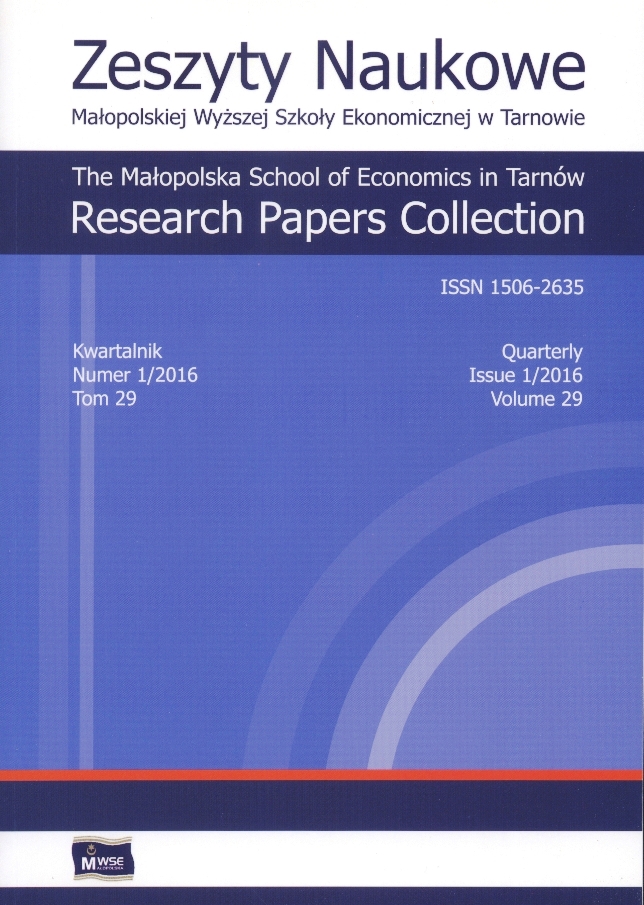Abstract
Contemporary enterprises have to response to changes in the surrounding environment fast and effectively in order to remain on the market and built competitive advantage. However, it is essential to possess knowledge, develop skills and abilities among managers and workers to be able to cope with such challenges. Among them it is also possible to differentiate creativeness, entrepreneurship and innovations which characterise social activities at a greater and greater level. On the basis of such a background, social entrepreneurship, which can offer innovative solutions in work processes, has been developing dynamically in the last decade. In this paper the problem of innovations in enterprises in the context of humanisation of work environment is presented. For this aim, the notions of innovative processes and technical progres are described. Afterwards, the aspects of shaping work processes in respect to possibilities and needs of labour market are widely discussed. In the next part of the paper the results of the research concerning comprehension of work process and innovativeness in industrial practice are presented. The analysis of the study shows a wide scope of the interpretation of both issues among the respondents, which was confirmed in the literaturę review. The main aims of enterprise innovativeness are: being active in practice, continuous analysis of realisation of activities, systematic consideration of changes in the surrounding environment, achievement of better and more effective economic solutions and specific knowledge at each work stand.
References
Berezka, A. (2012). Nietypowe formy zatrudnienia w Polsce na tle wybranych krajów Unii Europejskiej. Studia i Prace Wydziału Nauk Ekonomicznych i Zarządzania. Uniwersytet Szczeciński, 28, 97–116.
View in Google Scholar
Bullinger, H.-J., Warnecke, H.-J., Westkämper, E. (2003). Neue Organisationsformen im Unternehmen. 2 ed. Berlin–Heidelberg: Springer-Verlag. ISBN 978-3-662-08934-7.
View in Google Scholar
Cieślik, J. (2014). Przedsiębiorczość, polityka, rozwój. Warszawa: Wydawnictwo Akademickie SEDNO. ISBN 978-83-7963-016-5.
View in Google Scholar
Duraj, J., Papiernik-Wojdera, M. (2010). Przedsiębiorczość i innowacyjność. Warszawa: Difin. ISBN 978-83-7641-285-6.
View in Google Scholar
Dworczyk, M., Szlasa, R. (2001). Zarządzanie innowacjami. Warszawa: Oficyna Wydawnicza Politechniki Warszawskiej. ISBN 83-7207-263-9.
View in Google Scholar
Góźdź, B. (2013). Przedsiębiorczość społeczna. Zarządzanie i Finanse, 11(1), 231–240.
View in Google Scholar
Kawecka-Endler, A. (2003). Human factors as a determinant of quality of work. W: C. Stephanidis, J. Jacko (red.). Human-Computer Interaction: Theory and Practice, Part II (s. 1371–1375). Mahwah, NJ–London: Lawrence Erlbaum Associates Publishers.
View in Google Scholar
Kawecka-Endler, A. (2007). Safety and hygiene of work as a basis of the enterprises strategy. W: L. Pacholski, S. Trzcieliński (red.). Ergonomics in Contemporary Enterprise (s. 256–262). Madison: IEA Press. ISBN 978-0-9796435-0-7.
View in Google Scholar
Kawecka-Endler, A. (2012). Nowe formy zatrudnienia a bezpieczeństwo pracy. W: J. Charytonowicz (red.). Zastosowania ergonomii (s. 49–54). Wrocław: Wydawnictwo PTErg., Oddział we Wrocławiu. ISBN 978-83-7775-141.
View in Google Scholar
Kawecka-Endler, A. (2014). Humanizacja a nowe formy pracy. Zeszyty Naukowe Organizacja i Zarządzanie, 63, 115–129.
View in Google Scholar
Kawecka-Endler, A., Mrugalska, B. (2010). Contemporary aspects in design of work. W: W. Karwowski, G. Salvendy (red.). Advances in Human Factors, Ergonomics and Safety in Manufacturing and Service Industries (s. 401–411). Boca Raton: CRC Press. ISBN 978-14-3983-49-92.
View in Google Scholar
Kawecka-Endler, A., Mrugalska, B. (2012). Analysis of changes in work processes. W: P. Vink (red.). Advances in Social and Organizational Factors (s. 672–681). Boca Raton: CRC Press. ISBN 978-14-3987-01-98.
View in Google Scholar
Kawecka-Endler, A., Mrugalska, B. (2014). Humanization of work and environmental protection in activity of enterprise. W: C. Stephanidis, M. Antona (red.). Universal Access in Human-Computer Interaction (s. 700–709). HCII 2014, Part III, LNCS 8515.
View in Google Scholar
Krzyśków, B. (2009). Ochrona pracowników zatrudnionych w nietypowych stosunkach pracy. Bezpieczeństwo Pracy, 5, 17–19.
View in Google Scholar
Kurleto, M. (2014). Innowacyjność w przedsiębiorczości społecznej a ustawowy zakres filantropii i dobroczynności. W: H. Bieniok (red.). Innowacyjność współczesnych organizacji. Cz. 1. Koncepcje i modele (s. 130–141). Zeszyty Naukowe Wydziałowe Uniwersytetu Ekonomicznego w Katowicach. Studia Ekonomiczne. Katowice: Uniwersytet Ekonomiczny w Katowicach.
View in Google Scholar
Leksykon naukowo-techniczny. (1994). Warszawa: WNT. ISBN 83-204-2571-9.
View in Google Scholar
OECD, Eurostat. (2008). Podręcznik Oslo: pomiar działalności naukowej i technicznej: zasady gromadzenia i interpretacji danych dotyczących innowacji. Warszawa: Ministerstwo Nauki i Szkolnictwa Wyższego. Departament Strategii i Rozwoju Nauki. ISBN 978-83-61100-13-3.
View in Google Scholar
Pomykalski, A. (2001). Zarządzanie innowacjami. Warszawa–Łódź: Wydawnictwo Naukowe PWN. ISBN 83-01-13480-1.
View in Google Scholar
Pszczołowski, T. (1978). Mała encyklopedia prakseologii i teorii organizacji. Wrocław: Ossolineum. ISBN 83-7016-925-2.
View in Google Scholar
Zadura-Lichota, P. (red.). (2015). Innowacyjna przedsiębiorczość w Polsce. Odkryty i ukryty potencjał polskiej innowacyjności. Warszawa: PARP. ISBN 978-83-7633-203-1.
View in Google Scholar
Zięba, M. (2011). Innowacje w małych i średnich przedsiębiorstwach – rozważania teoretyczne. Przegląd Organizacji, 7/8, 8–11.
View in Google Scholar
© Copyright by Małopolska School of Economics in Tarnów. The articles are available under the Creative Commons Attribution NonCommercial-NoDerivatives 4.0 International License


